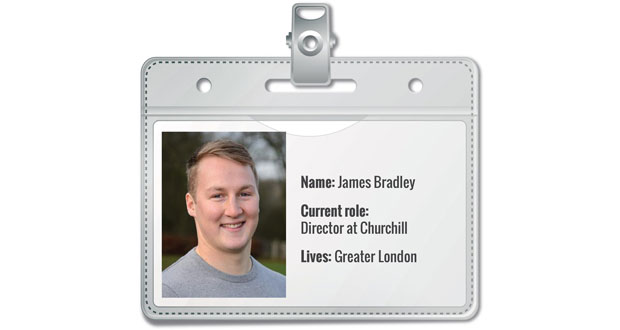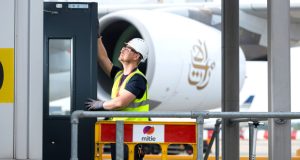Q: What first attracted you to working in FM, did you have much awareness of the profession?
I wasn’t particularly familiar with FM until University when I started researching graduate leadership schemes, and I heard about a scheme with a major FM company. Over the course of phone interviews, online assessments and in-person interviews, I got to learn about the diversity of brands that require FM and the variety of work involved. That piqued my interest and I haven’t looked back since.
Q: How did you progress through the profession to your current role?
I had five placements during my grad scheme – procurement, sales, operations, corporate development and a client secondment – which afforded me a broad exposure to PLC life. Following the end of the scheme, I secured a full time leadership role to deliver to an internal customer base, which in hindsight I am particularly grateful for, as it allowed me to develop my skills with the safety net of it being internal, rather than client-facing. When I did switch to client facing work, I was Head of Operations for our London FM business. This leadership role was responsible for delivering a diverse range of FM services into major brands such as Warner Brothers, Allianz and Estee Lauder. I joined Churchill in early 2017 as I wanted to experience working in a founder-led, privately-owned organisation. I initially joined to head up an acquisition integration and now have a broader leadership role on the Group board.
Q: What have you found the most challenging experiences working in FM?
The nature of the industry means that very few projects have a start, a middle and an end. Continuous work like this can make it feel like you are never completing a mission. It also raises a challenge in how you recognise success on an ongoing basis, for everyone involved. We’re a people-led sector with employees from a range of backgrounds and I’m always considering how to keep everyone happy, healthy and motivated.
Q: What have you found most satisfying about working in the sector?
Without doubt, it’s the variety of things I get to do. Right from the grad scheme and my multiple placements and throughout my career I’ve been incredibly fortunate to develop well-rounded experiences and skills across numerous sectors and disciplines.
Q: Are you a member of any FM association or body and if so what benefits do you think they provide?
I’m currently the Co-Chair of Emerging Workplace Leaders, a group of FM and workplace professionals. Our goal is to create a community and platform that enables emerging workplace leaders to connect and accelerate their personal & professional growth. It’s fantastic to be part of a network outside of my immediate work network and a pleasure to support people at the early stages of their careers. It’s also a great way to promote FM as an industry. One of the ways we do this is through the PFM Young Leader of the Year award, of which I’m the lead judge.
Q: What qualities do you think are most needed for a successful career in FM?
Being open-minded and people-focused is a must. Tied into this is strong emotional intelligence to help understand everyone’s point of view. And a good eye for problem solving can be invaluable.
Q: What has changed about your job role since the COVID-19 crisis? E.g. home working, furloughed, redeployed?
I’ve been working from home a lot, and as for my day-to-day work, we’ve been spending a lot of time developing useful tools in Mo:dus, the Churchill digital platform. These include a COVID symptom tracker and communications tools that make it easier for displaced teams to keep in touch. As a company, we’ve inevitably dealt with a lot of change and I believe both Churchill and the sector have handled it well. I’m proud we’ve collectively been able to support our clients through these very challenging times.
Q: What is your organisation doing to ensure the wellbeing of staff – whether working at home or returning to the workplace?
We created a wellness centre in Mo:dus with guides and videos for yoga and meditation. We of course share company-wide leadership updates, but also recognise the importance of local teams staying connected. I have an espresso morning with my direct team each week and have found the time hugely beneficial. Often we would only touch briefly on work and spend the majority of the time having a chat. After the first lockdown we supported staff in having a physical meeting outside once per week in a local park, for example. As we head towards the spring we’ll be considering how else we can support each other once it becomes possible to see each other in person again.
Q: Do you believe the pandemic has highlighted the important role of the FM sector and what areas do you see as most key?
Undoubtably so. Cleaning is an obvious example, and security officers have been the unsung heroes – theirs has statistically been one of the most dangerous roles and they have done amazing work to keep people and premises safe. Engineering teams have faced a challenge in keeping buildings compliant and energy efficient. Water management in particular has been tough as many systems are designed with regular, daily usage expected. It’s vital at the best of times to keep building occupants safe, and even more so when the NHS is under such strain – a major Legionnaires outbreak would be catastrophic.
Q: What advice would you give to someone coming into the profession now?
If you’re entering FM for the first time, try to get operational experience working with a client early on, ideally on an integrated account. It’s the best way to get a feel for how everything works. If you choose to specialise too early you may not have the chance to develop this broad understanding.
Q: Which of your achievements are you most proud of during your career?
I actually won the aforementioned PFM Young Leader of the Year award in 2015. It was very humbling, and I had been nominated by my managing director at the time, which was great recognition.
Q: What do you predict could be the main changes to the FM sector post pandemic?
I foresee two major changes. The first is how we will deliver our services to people. I can see a hub and spoke model developing. For example, big shopping centres may address retail struggles by integrating office space and areas for corporate collaboration (and good coffee), almost becoming a micro-city. These local-economies could spring up across the country and enable a regional rebalance of where money is earned and spent. The second change is how the sector address inequality. The pandemic has shone a light on social inequalities and the sector is in a great position to address this thanks to the diversity of our work, roles and people. We can use our connections across numerous industries to influence and enact change at businesses of all sizes. We can also have a direct impact by offering routes into FM. There may be people with 20+ years of experience in a sector who have lost their jobs because of the pandemic and may not realise that FM is a viable option.





